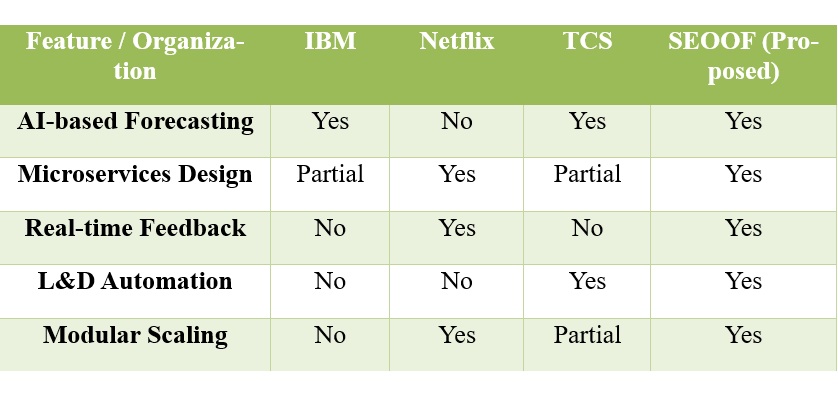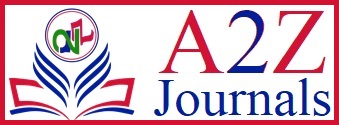Scalable Employee Operations Oversight Framework

DOI:
https://doi.org/10.54060/a2zjournals.jmss.84Keywords:
Employee oversight, Abstractive summarization complexity, workforce analytics, HR automation, organizational scalabilityAbstract
The increasing complexity and dynamism of modern organizations have underscored the need for scalable and adaptive frameworks to oversee employee operations. Traditional HR systems often lack the flexibility to handle distributed teams, evolving performance metrics, and real-time feedback loops. This paper introduces the Scalable Employee Operations Oversight Framework (SEOOF), a modular, AI-enabled model that integrates microservices architecture to enhance workforce agility, data transparency, and decision-making. By combining predictive analytics, automated feedback systems, and real-time reporting mechanisms, SEOOF addresses the inefficiencies of legacy systems. The framework is validated through literature synthesis and real-world case evaluations, demonstrating its ability to streamline operations, reduce costs, and improve employee engagement across industries.
Downloads
References
M. Beer et al., High Commitment, High Performance Management, Boston, MA: Harvard Business School Press, 2015.
J. Bersin, “HR Technology Disruptions,” Josh Bersin Company Reports, 2022.
Deloitte Insights, The Rise of the Social Enterprise, Deloitte, 2020.
M. Armstrong, Armstrong’s Handbook of Human Resource Management Practice, 15th ed., London, UK: Kogan Page, 2020.
SAP, Limitations of Legacy HR Systems, SAP White Paper, 2021.
Oracle, Modern HR Transformation, Oracle Human Capital Management Report, 2020.
Gallup, Performance Management Research, Gallup, 2019.
CEB Global, The Myth of Performance Reviews, CEB, 2018.
LinkedIn Talent Solutions, AI in Hiring and HR, LinkedIn Corporation, 2021.
IBM, Watson Applied to Human Resources, IBM, 2019.
Gartner, Top 10 HR Technology Trends, Gartner Inc., 2020.
McKinsey & Company, The AI-Powered Organization, McKinsey Insights, 2021.
L. Floridi et al., “AI4People—An Ethical Framework for a Good AI Society,” Minds and Machines, vol. 28, no. 4, pp. 689–707, 2018.
M. Fowler, Monolith to Microservices, Boston, MA: Addison-Wesley, 2018.
S. Newman, Building Microservices, 2nd ed., Sebastopol, CA: O’Reilly Media, 2021.
Red Hat, Microservices in the Enterprise, Red Hat White Paper, 2022.
ThoughtWorks, Scalable HR Systems Architecture, ThoughtWorks Technology Radar, 2021.
Google Cloud, Microservices Deployment Models, Google Cloud, 2020.
Accenture, Digital HR Transformation, Accenture Research, 2021.
Harvard Business Review, “Real-Time Feedback and Productivity,” HBR, 2022.
PwC, Future of HR: Powered by AI, PwC Report, 2020.
A. R. Hevner et al., “Design Science in Information Systems Research,” MIS Quarterly, vol. 28,
no. 1, pp. 75–105, 2004.
IBM Research, Attrition Forecasting via AI, IBM Research Report, 2020.
Microsoft Azure, Anomaly Detection in Workforce Analytics, Microsoft White Paper, 2021.
Coursera and Degreed, Skill Mapping in Digital L&D, Joint Industry Report, 2022.
IBM Case Studies, Cognitive Talent Management at IBM, IBM, 2019.
R. Hastings and E. Meyer, No Rules Rules: Netflix and the Culture of Reinvention, New York, NY: Penguin Press, 2020.
TCS Research, AI in Workforce Planning, Tata Consultancy Services, 2021.
Amazon AWS, Scaling Microservices Systems, Amazon Web Services, 2022.
Slack and Workday, Integration Reports, Slack Technologies, 2020.
HBR Analytics, Predictive Performance Systems, Harvard Business Review, 2021.
Salesforce, Modular Oversight Dashboards, Salesforce Report, 2021.
Zapier, APIs for HR Tool Interoperability, Zapier, 2020.
European Union, GDPR Compliance Guidelines, Brussels, Belgium: EU Commission, 2022.
Deloitte, Cost of AI Adoption in HR, Deloitte Insights, 2020.
SHRM, Future Skills for HR Professionals, Society for Human Resource Management, 2021.
R. Binns, “Fairness in Machine Learning: Lessons from Political Philosophy,” in Proc. Conf. Fairness, Accountability and Transparency (FAT), 2018, pp. 149–159.
E. L. Trist and K. W. Bamforth, “The Evolution of Socio-Technical Systems,” in Socio-Technical Systems: A Sourcebook, London, UK: Tavistock, 1981.
CIPD, Agile HR and Continuous Feedback Models, Chartered Institute of Personnel and Development, 2020.
Nvidia Research, Federated Learning for Edge AI, Nvidia White Paper, 2022.

Downloads
Published
How to Cite
CITATION COUNT
Issue
Section
License
Copyright (c) 2025 Fiza Khan, Dr Pooja Khanna

This work is licensed under a Creative Commons Attribution 4.0 International License.
























